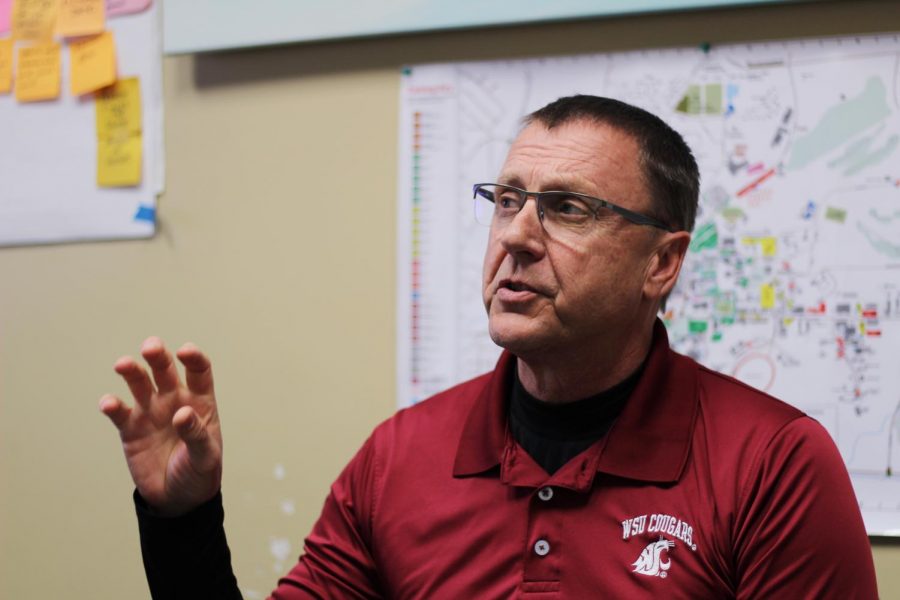No right, wrong way to commute to campus
WSU Transportation Services should work to reduce cost of parking
RUBY PITTS-CRANSTON | THE DAILY EVERGREEN
Associate Director of Transportation Chris Boyan discusses how citations are meant to help parking on campus Wednesday at Transportation Services.
October 24, 2018
Pullman is unique among American college towns. Due to its unusual layout geographically and the difference in culture between the city of Pullman and the campus of WSU, transportation is a challenge for many students and faculty who live off campus.
As a university, WSU has a hardworking transportation department that funds parking lots, buses and advocates for personal transport methods such as walking or biking. Transportation is an auxiliary of the university, meaning it does not receive funding from federal and state grants or tuition despite providing an important service for the university.
Although the effort is there in terms of creating an effective mode of transport for every student on campus, there is still much work to be done so that students are able to move without limitations around campus, Pullman and the greater Palouse.
Parking passes are the primary source of income for WSU Transportation Services, which reported over $4.6 million of revenue in 2017, according to its website, over half of which was generated through parking permits. While the perception of the department is that it only writes tickets, citation revenue is just over one-fifth of the size of permit revenue.
Chris Boyan, associate director of WSU Transportation Services, emphasized using alternative modes of transportation whenever possible but said he understands the obstacles students face, such as weather or learning the ropes of a new method of transport like busing or vanpooling.
“The primary purpose of citations is to ensure that people who paid for access to a lot receive that access,” Boyan said.
This system has proven effective. However, there is still something to be desired in terms of price. Parking passes cost hundreds of dollars and that price is not affordable for many students on campus, which brings citations and financial strain on students who are holding on by a thread in some cases.
In order to make it to classes, buses provide an effective method of bringing students and staff onto campus. However, these buses have limitations when it comes to commuting outside of normal hours or outside of Pullman. Although alternatives exist for those without a car, they don’t come close to being as convenient.
While alternative modes of transportation should be explored, my primary mode of transportation is still driving a personal vehicle. Pullman roads are drivable and make for a relatively quick way to get to campus. While carpooling and ridesharing can be more efficient, it is not always an option for everyone, and because of this, parking becomes a necessity for thousands of students and staff.
The solution I am seeking is simply a lower cost on parking permits for students that mirrors the prices set by other institutions throughout the state. Eastern Washington University charges $370 per year for its highest level pass, while passes at WSU can cost upwards of $600 per year.
Parking passes are an important stream of revenue that help the university properly function, but at the end of the day students should be the top priority.
By lowering the cost of parking passes for students, an effective, low-cost way of arriving on campus for everyone would be created while alternative methods can still be optimized. In order to replenish this revenue, the university could make parking citations more expensive, which only punishes rule-breakers, as well as raising the prices for football game day parking.
While environmental and mass methods of transportation should be encouraged as the top priority, student financial needs should be taken into account.










